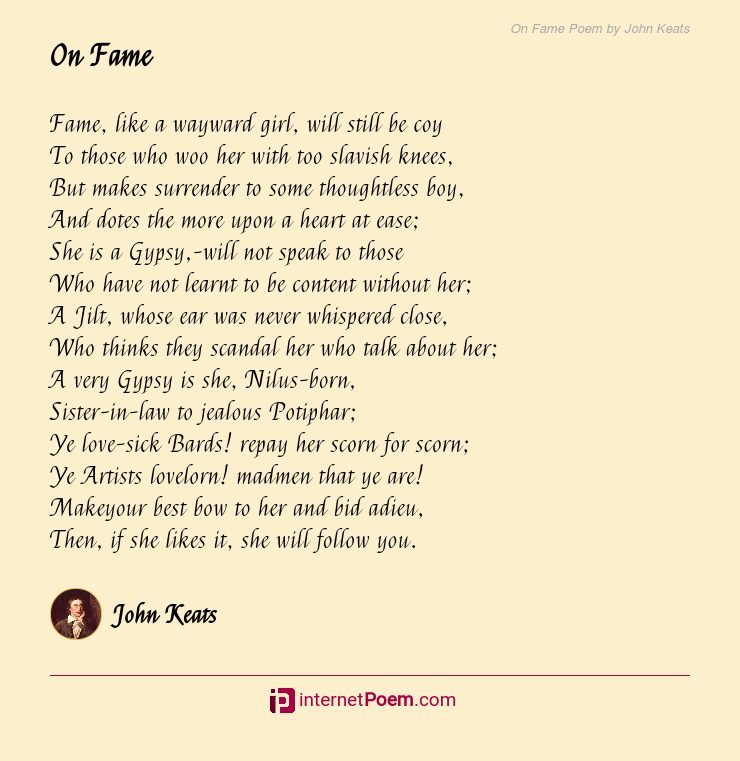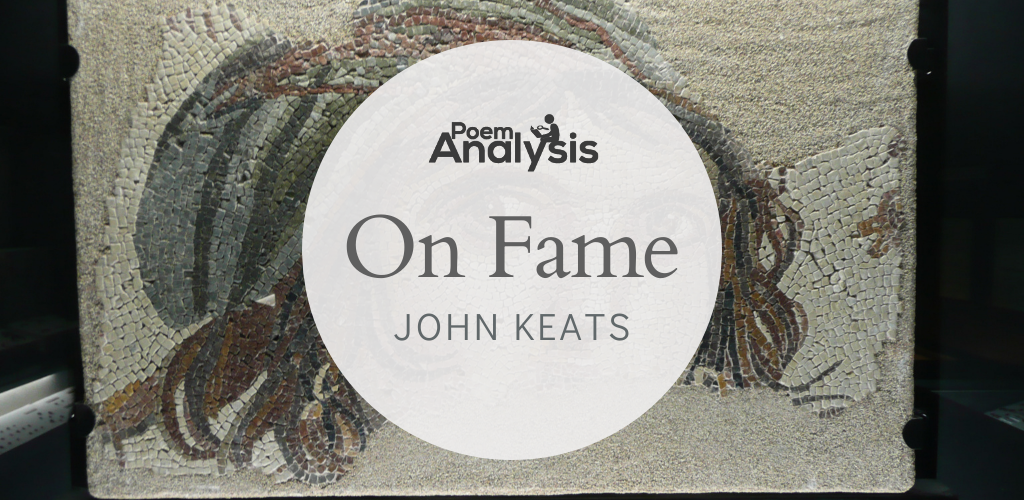“On Fame” is a very famous poem that was published before sometimes of John Keats’s death. “On Fame” is a sonnet which is written in Shakespearean style.
Summary
This poem consists of 750 words but there is no stanza division. The poem begins with a statement like a person is very fevered because he cannot see the mortal world and days with his blood. By these lines, Keats tries to say that the person is very strange.
“Who vexes all the leaves of his life’s book,
And robs his fair name of its maidenhood;
It is as if the rose should pluck herself,”
The person can vex all the pages from his book and he robs his name from the present age to maidenhood. Here, the poet utters gives a reference to a rose that is plucking herself off to be rise from the beginning.

Keats calls the rose ’her’ which symbolizes that the rose is a female. The sweet, delicious grain’s ripeness and push its finger upon the misty bloom. So, these lines are fantastically written with romantic touches.
The scene is looking like a naiad or water nymph has taken the role of meddling. The atmosphere is pushing her into darkness and her pure grot is mixing with muddy gloom. This is how the poem is proceeding. This is a perfect example of a romantic poem.
“But the rose leaves herself upon the briar,
For winds to kiss and grateful bees to feed,
And the ripe plum still wears its dim attire,”
But some roses leave her for these briars. Briar is a wild rose which is the opening imagery. The rose leaves herself so that the bees can drink and feed honey from its breast. But the plum that was there is still looking like that with a dim manner as if they are worried.
Then the poet talks about this frozen lake where it is looking like crystal shinings. The lake is lying like no one is disturbing even for a while.
“Why then should man, teasing the world for grace,
Spoil his salvation for a fierce miscreed?”
Here, in the last segment, Keats raises a question that is why the man is teasing the world for grace? And spoiling his salvation for this worst fierce miscreed?
This question remains unanswered probably the question is thrown to the readers to answer. There the stanza ends.
Analysis and Theme
The main point that we will focus on is true romanticism. Here the poet gives many references to exemplify nature. The poet in the last part of the poem raises the question that why people always spoil nature’s salvation. There is keen mockery that can be found because he is crucially thinking on nature’s verge.

Then comes the theme. Here the main theme is nature based on how the poem is being developed. From the very first part to the last part a single thought is being continued.
Nature is very beautiful and also consists of nine, valleys, leaves, etc. Besides these all, mockery towards society has also become a theme.
Literary Devices
Literary devices are the major parts of the poem. Here, Keats uses many devices to explore the poem in many ways. The rhyming pattern of the poem is “abab cdcd efeggf”.
Imagery is a relevant literary device that works to open a clear image in front of all the readers.
“if a Naiad, like a meddling elf”
Then comes exaggeration as a device. Here, the poet is exaggerating the lines by continuing the thought.
Alliteration is another rhetorical device that refers to the repetition of the same sound used in a single line like,
“grot with muddy gloom”
And,
“Spoil his salvation”
Here, “G” and “S” sounds are being repeated twice.
So, these are all significant devices. Though there are some more devices these are not very relevant.
